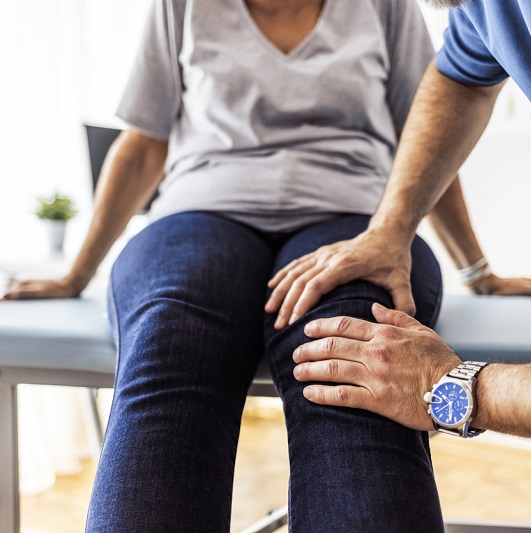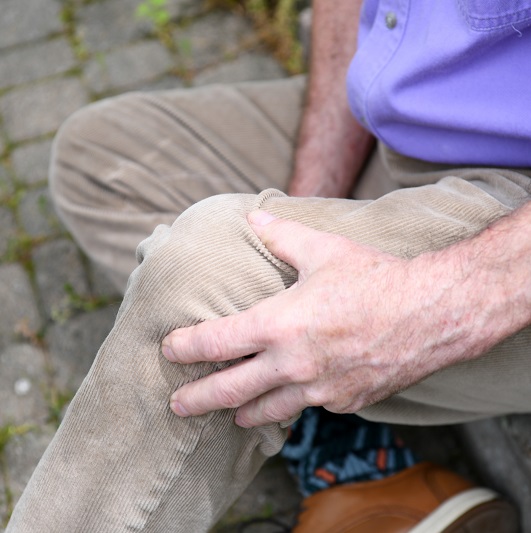Understanding Arthritis: Causes, Treatments and Prevention

July 30, 2025
Arthritis is a term that describes joint pain, swelling and stiffness. There are many types of arthritis, and treatments can vary. Some treatments ease symptoms, while others aim to stop the disease. Read on to learn about causes, treatments and prevention tips from rheumatologist Melinda Collins, D.O.
Types of Arthritis
To most people, arthritis means joint pain. But over 100 conditions cause joint pain, and not all are considered arthritis.
Doctors look at inflammation (swelling) to tell the difference between two main types:
- Arthritis (inflammatory joint pain)
- Arthralgias (non inflammatory joint pain, such as aches from the flu)
The difference matters because each is treated differently. Arthritis is usually a diagnosed condition. Arthralgia is a general term for joint ache.
As a rheumatologist, Dr. Collins treats both, but arthritis is one of her main focuses. The five most common types of arthritis are:
- Osteoarthritis: The most common type, but it affects people in different ways. It was once called “wear and tear” arthritis, but research shows it’s more complex. Experts are still looking for triggers and targeted treatments.
- Rheumatoid arthritis is a complex disease linked to both genes and the environment.
- Crystal arthritis (gout/pseudogout) is caused by a buildup of crystals (uric acid or calcium) in the joints. There are many causes of crystal build up, such as diet, genetics, kidney disease and medications.
- Psoriatic arthritis is seen in people with psoriasis and can run in families. The cause is not well understood.
- Reactive arthritis is a type of arthritis triggered by a recent infection.|
Symptoms of Arthritis
Joint pain
Depending on the type of arthritis, it may feel better or worse with movement.
Stiffness
Difficulty moving the joints, especially after rest.
Swelling
Fluid builds up inside or around the joint.
Reduced function
Difficulty doing daily tasks due to joint pain, swelling or stiffness
If not treated, Dr. Collins says arthritis symptoms can worsen over time. This is because inflammation can damage the joint, causing permanent changes.
Causes and Risk Factors of Arthritis
Many things can increase your risk of arthritis, such as:
- Genetics: Family history can increase your risk.
- Gender: Some types of arthritis are more common in women or men, often linked to hormones..
- Weight: Extra weight puts more pressure on joints and may make medicine less effective.
- Joint injury: A past injury can lead to arthritis later.
- Lifestyle: Smoking and alcohol can raise inflammation. Smoking tobacco is a known risk factor for rheumatoid arthritis.
Diagnosing Arthritis
If you think you have arthritis, talk to your primary care provider. They may use these tools and tests to diagnose the problem:
- Physical examination: Your provider checks for pain, warmth, redness, swelling and limited movement.
- X-rays: Show bones that make up a joint and the joint space.
- MRI: Useful in some cases to show damage to soft tissues and inflammation.
- Blood tests: To find signs of inflammation or certain diseases such as rheumatoid arthritis
How to Treat Arthritis
Treatment depends on the specific type of arthritis. Some treatments ease symptoms. Others aim to stop the disease..
- Medications: Over-the-counter or prescriptions can help.
- Physical therapy: Exercises that help improve strength, flexibility and range of motion.
- Occupational therapy: Exercises that teach ways to do daily tasks more easily.
- Assistive devices: Canes, walkers and braces help support joints and mobility.
- Surgery: In serious cases, surgery may be needed to fix or replace a joint.
How to Prevent Arthritis
There’s no sure way to prevent arthritis, but Dr. Collins says you can lower your risk and protect your joints by:
- Staying at a healthy body weight
- Quitting smoking and limiting alcohol use
- Exercising regularly
- Eating a healthy diet
- Wearing proper protection if you work with dust, chemicals or fertilizers
By living a healthy lifestyle and working with your doctor, you can manage arthritis and live a fulfilling life.
Next steps and resources:
- Meet Our Source: Melinda Collins, D.O.
- To make an appointment with a rheumatologist, call 800-822-8905 or visit our website.
- Learn more about rheumatology at Hackensack Meridian Health.
The material provided through HealthU is intended to be used as general information only and should not replace the advice of your physician. Always consult your physician for individual care.







